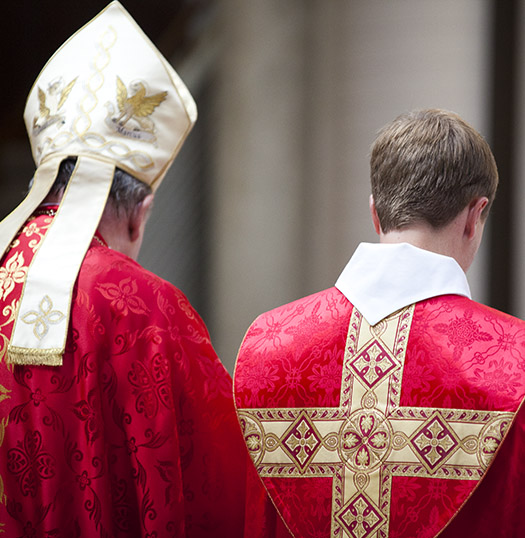
The Episcopal and Anglican Studies Program is a community of learning, worship and service within the wider Candler ecumenical community, and includes faculty, staff and students of all degree programs, ordained and lay, those preparing for parish ministry or chaplaincy and those seeking to pursue God’s call to ministry outside the parish.
The primary gathering of the program is the weekly Solemn Evensong and Holy Eucharist, held in Cannon Chapel or the Wesley Teaching Chapel every Wednesday of the school year at 5:00 p.m. Other events include guest lectures by important figures in Anglicanism such as Presiding Bishop Michael Curry, periodic meetings of all Anglican and Episcopal students at Candler for discussion and fellowship, and courses taught by world-class scholars and teachers on the Candler faculty who are also active communicants of the Episcopal or Anglican Church.
Educational Components
Candler students enrolled in the Master of Divinity (MDiv) degree program who are preparing for ordained parish ministry under the supervision of a bishop may earn a certificate in Episcopal and Anglican Studies. The certificate is 33 hours in length and includes academic work in liturgical studies, Anglican theology, church polity and Anglican spiritual practices, as well as supervised parish ministry experience each semester. All academic courses in the program are open to any Candler student. For a list of courses, visit the certificate link above.
There are two separate Contextual Education programs for Episcopalians in Candler’s Master of Divinity (MDiv) program. Students earning an Episcopal and Anglican Studies certificate spend all three years in parish placements and meet as a separate group for theological reflection on their ministry. Episcopal students who are not in the certificate program join the bulk of MDiv students in spending their first year in non-parish ministry, and the second in a parish, while meeting in ecumenical groups for reflection.
Episcopal and Anglican Studies Contextual Education
The Episcopal and Anglican Studies Program (EASP) contextual education is designed to enhance priestly formation and is centered on real-life ministry that takes place in carefully supervised student placements. Students typically:
- Work 8 hours a week in an Episcopal/Anglican parish for three years
- Receive weekly supervision from an experienced priest
- Meet two hours per week for EASP Contextual Education with faculty, other students in the certificate program, and experts
- Receive a small stipend for their parish placement work
Non-Certificate Contextual Education
Episcopal students not enrolled in the certificate program take two years of Contextual Education, one of which is in a parish. Students typically:
- Work four hours a week in a clinical or social setting for the first year (Contextual Education I)
- Work eight hours a week in a parish setting for the second year (Contextual Education II)
- Receive mentoring from a site supervisor weekly (Contextual Education I) or bi-weekly (Contextual Education II)
- Participate in scheduled reflection groups with Candler students, practitioners, and faculty from different denominations
- Do not receive a stipend, although some sites do provide stipends
Both certificate and non-certificate Episcopal students can find possible parish placements on the Contextual Education II Site Directory. When making contact with site supervisors, students should stipulate which program they are enrolled in: Episcopal Contextual Education (three years) or Contextual Education II (one year). The Director of Episcopal and Anglican Studies is available to all students for consultation about appropriate parish placements.
Episcopal and Anglican Studies Certificate Contextual Education
Mentors who wish to have an Episcopal Contextual Education student (three years) must meet the minimum requirements for Contextual Education II and list their site on the Contextual Education II Site Directory. A site mentor should review the Guidelines for Ecclesial Practices to ensure that their site is an appropriate placement before applying to the site directory.
Additional requirements for Episcopal Contextual Education are:
- The commitment is for three years in the same parish with the same mentor, for 10 hours per week
- The mentor should be available to meet with the Wednesday contextual education group for the student’s case studies (usually two to three times a semester)
- The student should be given responsibilities for a wide variety of parish activities over the three years: liturgical (including preaching), pastoral care, religious education, parish administration, and mission/outreach
- The student should be given an independent project to complete
- The parish should provide a minimum stipend of $50 per week
Mentors and students should complete the Episcopal Contextual Education Contract and file the original with the Office of Contextual Education and a copy with the Director of Episcopal Studies.
Non-Certificate Contextual Education II
All parish placement sites and mentors must meet the minimum requirements for Contextual Education II and list their site on the ConEd II Site Directory. A site mentor should review the Guidelines for Ecclesial Practices to ensure that their site is an appropriate placement before applying to the site directory.
Mentors who wish to have a ConEd II student (one year) should complete the Contextual Education II Contract with that student and file it with the Office of Contextual Education.
History
Episcopal and Anglican Studies Faculty
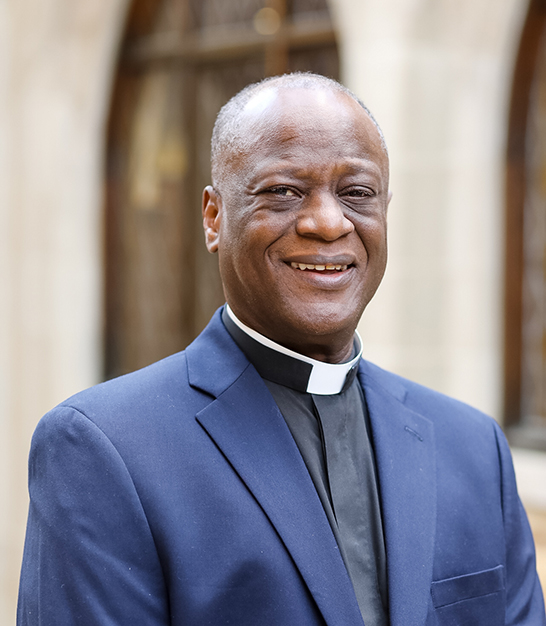
The Rev. John Thompson-Quartey
Professor in the Practice of Church Leadership; Director of the Episcopal and Anglican Studies Program
Thompson-Quartey has served as Canon for Ministry in the diocese of Atlanta since 2014. In this role, he initiated a plan for congregational vitality that culminated in the creation of the diocese’s College for Congregational Development. He has also worked to revitalize campus ministries and increase student participation, which has included the launch of three new campus ministries. Prior to arriving in Atlanta, Thompson-Quartey served as rector of St. Mary’s by-the-Sea Episcopal Church in Point Pleasant Beach, New Jersey, for nine years. He is trained in adaptive leadership through the Clergy Leadership Project, which equips experienced clergy with skills for navigating leadership challenges in parish ministry. He has held numerous leadership positions and is the current vice president for social justice for the National Brotherhood of St. Andrew.
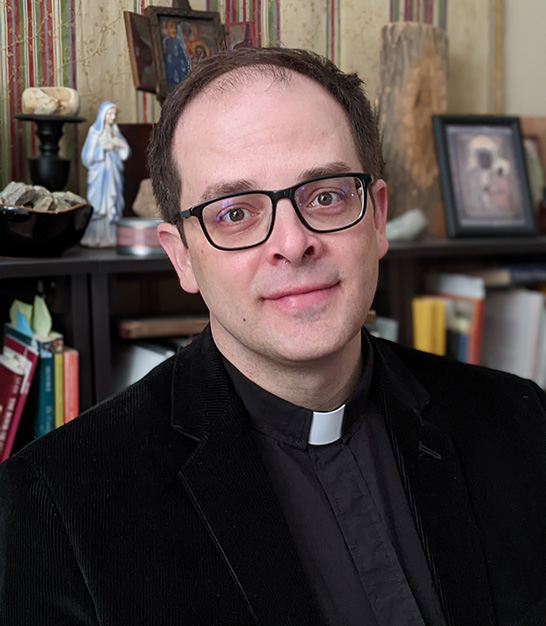
The Rev. Stuart Higginbotham
Assistant Professor in the Practice of Spiritual Formation and Ministry
Higginbotham joined the Candler faculty in 2023. His work focuses especially on contextual education within the Episcopal and Anglican Studies program. He was ordained an Episcopal priest in 2008 and has served as the rector of Grace Episcopal Church in Gainesville, Georgia, since 2014. He has served in many leadership roles within the Episcopal Diocese of Atlanta and has also led retreats and workshops throughout the United States. Higginbotham’s vocation focuses on the connections between the wisdom of the ancient Christian contemplative tradition and the current dynamics of congregational ministry. Both his pastoral and academic work draw on Christian and interfaith sources to nurture faithful and sustainable embodiments of ministry. He is the author of The Heart of a Calling: The Practice of Christian Mindfulness in Congregational Ministry (Crossroads, 2021) and is co-editor of Contemplation and Communion: A Gathering of Fresh Voices for a Living Tradition (Crossroads, 2019) as well as other articles and contributions.
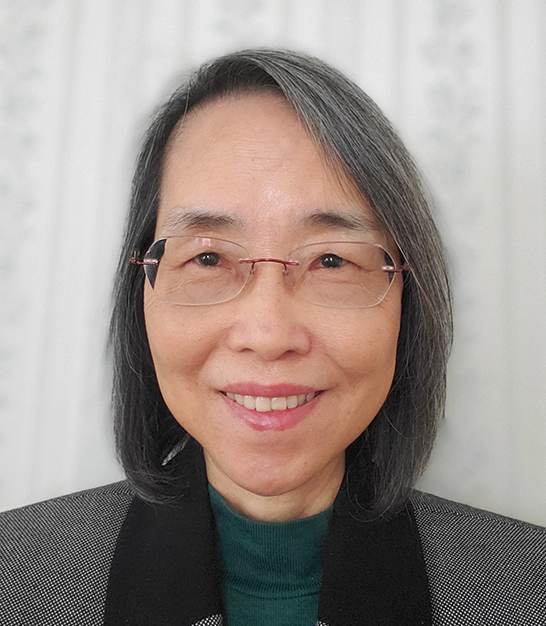
Dr. Kwok Pui Lan
Dean's Professor of Systematic Theology
Kwok previously served as Distinguished Visiting Professor of Theology for the 2017-2018 and 2018-2019 academic years, and was named Faculty Person of the Year by the student body both years. She is the former William F. Cole Professor of Christian Theology and Spirituality at Episcopal Divinity School, and has also taught at the Chinese University of Hong Kong, Auburn Theological Seminary, Union Theological Seminary, and Yale Divinity School. Kwok’s research focuses on Asian feminist theology and postcolonial theology. She has written or edited 21 books in English and Chinese. An internationally known scholar, Kwok served as president of the American Academy of Religion in 2011, cofounded the network Pacific, Asian, North American Asian Women in Theology and Ministry, and has held leadership roles in the Association of Theological Schools and the Wabash Center for Teaching and Learning.
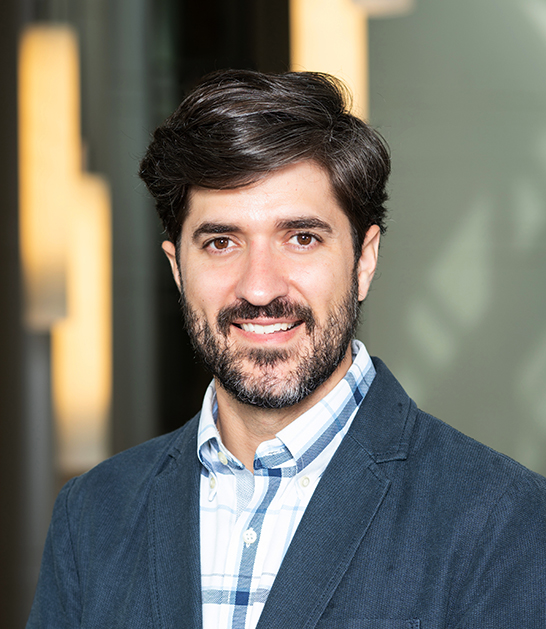
Dr. Kyle Lambelet
Assistant Professor in the Practice of Theology and Ethics; Director of Formation Communities Program
Lambelet came to Candler in 2017 as a Louisville Institute Postdoctoral Fellow. He holds an MTS from Vanderbilt University Divinity School, and a PhD from the joint degree program in Theology and Peace Studies at the University of Notre Dame. He teaches and researches at the intersection of political theology, religious ethics and social change. His first book ¡Presente! Nonviolent Politics and the Resurrection of the Dead (Georgetown University Press, 2019) explores the moral and political dimensions of nonviolent struggle through an extended case study of the movement to close the School of the Americas. His current research examines the apocalyptic dimensions of talk about climate change, and how apocalyptic political theologies can offer resources for pastoral and political engagement in the midst of endings. Prior to his postdoctoral fellowship, Lambelet worked for several years in faith-rooted organizing for racial and economic justice in the southeast United States.
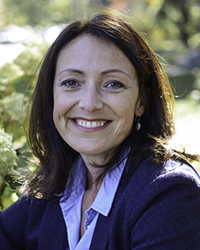
The Rev. Dr. Gabrielle Thomas
Assistant Professor of Early Christianity and Anglican Studies
Thomas joined the Candler faculty after serving as a lecturer in early Christianity and Anglican studies at Yale Divinity School. Prior to that, she spent two years as a post-doctoral research associate at Durham University in the United Kingdom. An ordained priest in the Church of England, she has served churches as both a lay and an ordained leader. She completed her PhD in Historical Theology at the University of Nottingham while working in full-time parish ministry. Thomas is a member of the Archbishop of Canterbury’s Theological Reflection Group, a small group of academic theologians who gather with the archbishop for an extended visit twice a year to reflect theologically on pressing issues in the church and the world. She has published three books: The Image of God in the Theology of Gregory Nazianzus (monograph, Cambridge, 2019), Women and Ordination in the Orthodox Church: Explorations in Theology and Practice (co-edited, Cascade, 2020), and For the Good of the Church: Unity, Theology and Women (monograph, SCM Press, 2021).
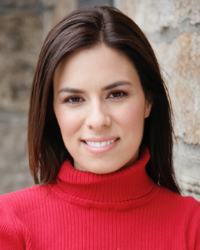
The Rev. Dr. Danielle Tumminio Hansen
Assistant Professor of Practical Theology and Spiritual Care
Tumminio Hansen joined the Candler faculty in 2021. Prior to arriving at Candler, she was assistant professor of pastoral theology and served as director of field education at Seminary of the Southwest in Austin, Texas, where she taught courses on trauma, practical theology, and pastoral theology, with a feminist, intersectional, and anti-racist lens. Tumminio Hansen has been a lecturer at Yale and Tufts universities, in addition to serving as chaplain at Groton School and as a parish priest in Lexington, Lincoln, and Quincy, Massachusetts. She is the author of several works in practical theology, namely Conceiving Family: A Practical Theology of Surrogacy and Self (Baylor University Press, 2019), God and Harry Potter at Yale (Unlocking Press, 2010), and Expecting Jesus (Morehouse, 2014), a series of Advent daily reflections.
FAQ
No. Candler School of Theology at Emory University is an accredited seminary of the United Methodist Church with an ecumenical faculty and student body. Anglicans and Episcopalians have traditionally constituted the third-largest denominational group at Candler (behind Methodists and Baptists). Since the early 1970s, the Episcopal and Anglican Studies program at Candler has trained priests for service in the Episcopal Church and Anglican Communion, drawing on the unique resources of Candler School of Theology.
The Episcopal Studies certificate is designed to equip Master of Divinity (MDiv) students for ministry in the Episcopal Church and broader Anglican Communion. It is centered on collegial reflection of real-life ministry that takes place in carefully supervised parish placements. The program includes ecumenical education in general theological studies; special academic work concentrating in liturgical studies, theology in the Anglican tradition, and worship from the Book of Common Prayer; and regular training in the spiritual practices of the priesthood. The certificate is part of the MDiv program and open only to MDiv students.
No. The Episcopal Studies Certificate is an MDiv program and requires enrollment in the MDiv degree.
Perhaps. Specific requirements for ordination are determined by bishops and their Commission on Ministry. Candler’s Episcopal and Anglian Studies Program offers an outstanding education with a world-class faculty, and while it meets and/or exceeds the training found at any denominational seminary, everyone’s situation is unique, and some students may be deemed in need of further “Anglicanizing” after the MDiv at Candler. The Director of Episcopal and Anglican Studies is available to consult with bishops on the particular needs of individual students.
No. If you are interested in being ordained in the Episcopal Church or another church in the Anglican Communion, you must go through the discernment process in your own diocese. Contact your parish priest and/or diocesan bishop to apply for vocational discernment.
Enrollment in the Episcopal Studies certificate program requires only the written approval of a bishop; many students begin the program while they are still in discernment. Other Anglican and Episcopal students complete their degree apart from the certificate, while taking advantage of the course and liturgical offerings of the Episcopal and Anglican Studies program. Weekly worship and all the courses in the program are open to any Candler student.
Episcopal and Anglican Studies at Candler is a “big tent” that embraces all Episcopal and Anglican students, no matter what their degree program or career goal. In fact, the majority of Episcopal and Anglican students are not enrolled in the certificate program.
The Diocese of Atlanta is a large, diverse place with many different types of parishes in different settings. Students in the Episcopal Studies certificate program typically serve one parish for all three years, usually in a parish that is different from what they are used to. Students not in the certificate program undergo a similarly rigorous Contextual Education program, working in non-parish ministry placements during the first year, and in parishes the second year.
Worship is central to the Episcopal and Anglican Studies Program. Each week we gather for either Evening Prayer, Solemn Evensong or Holy Eucharist, held in Cannon Chapel every Wednesday of the school year. Members of the Candler and Emory communities also are invited and encouraged to attend. In addition, there are regularly scheduled chapel services for the Candler community in Cannon Chapel.
We believe that Anglicanism is a “big tent” that encompasses many different viewpoints (most of which are represented one way or another on campus). We encourage free dialogue on issues of the day, from all points of view. The Episcopal and Anglican Studies program at Candler attempts to maintain conversation and communion among the varying strains of Anglicanism that exist on campus.
Absolutely. Candler offers one of the most robust financial aid programs in theological education, and scholarships are available to students of all denominations. While Candler’s financial aid offerings are generous, they are also competitive. Students are encouraged to apply early—by the priority deadline—for optimal consideration. Visit Candler’s financial aid page for information on opportunities.
You can apply online for any of Candler’s degree programs; visit the admissions section for more information. Those wishing to earn an Episcopal Studies certificate must first be accepted and registered for classes in Candler’s MDiv degree program. Contact the Director of Episcopal and Anglican Studies for help with any part of the application and enrollment process.